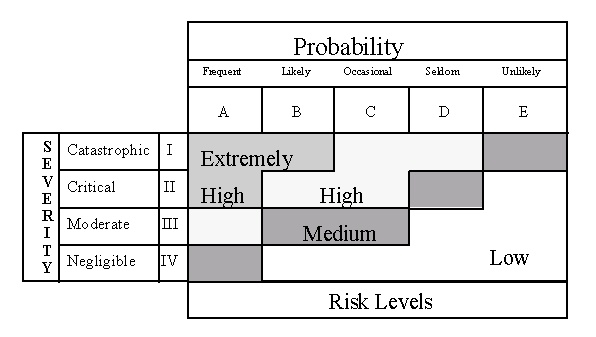
Compliance
Self Assessment
Compliance Process
CMMI Risk Management Goals
Risk Review
Policy
AF Policy Directive 90-9: Operational Risk Management, 1 April 2000
AFI 90-901: Operational Risk Management, 1 April 2000
AFMC Instruction 90-902: Operational Risk Management, Dec 2007

Procedures
Affinity Diagrams
Brainstorming
Risk Plotting
Risk Statements
Taxonomies
Individual
Consolidated
Risk Areas
Tools & Techniques
RiskNav
Risk Matrix
Risk Radar
Cost Risk and Uncertainty - Chapter 14, GAO Cost Estimating and Assessment Guide, Mar 09
Training
Risk Process Orientation
Detailed Risk Process
Facilitator Training
Examples
Sample Risk Management Plan
Process Lessons Learned
|
|
For additional information on risk management best practices and lessons learned, please see the Risk Management topic and articles in the online MITRE Systems Engineering Guide.
Acquisition Risk Management Probability Definitions
The risk rating is based on the probability of impact and the level of impact (manual mapping approach):
| Probability of Occurrence |
|---|
| 0 - 10% |
or |
Very unlikely to occur |
| 11 - 40% |
or |
Unlikely to occur |
| 41 - 60% |
or |
May occur about half of the time |
| 61 - 90% |
or |
Likely to occur |
| 91 - 100% |
or |
Very likely to occur |
The probability is a single percentage number and does not have to be exact as long as the group applies a consistent approach to estimating the probabilities for all the risks.
Make sure everyone is in agreement before moving on or get a decision from the program manager.
Reference: Risk Matrix User's Guide, Version 2.2, by Pamela E. Engert and Zachary F. Lansdowne, Mitre Document MP99B0000029, November 1999, The MITRE Corporation
Operational Risk Management Probability Definitions

- Frequent - Occurs often in career/equipment service life. Everyone exposed. Continuously experienced.
- Likely - Occurs several times in career/equipment service life. All members exposed. Occurs frequently.
- Occasional - Occurs sometime in career/equipment service life. All members exposed. Occurs sporadically, or several times in inventory/service life.
- Seldom - Possible to occur in career/equipment service life. All members exposed. Remote chance of occurrence; expected to occur sometime in inventory service life
- Unlikely - Can assume will not occur in career/equipment service life. All members exposed. Possible, but improbable; occurs only very rarely.
Reference: Pocket Guide to Operational Risk Management
Other Risk Management Probability Definitions
The associated risk event represents a future event that may occur. When we assess the probability a risk may occur, we are technically assessing a conditional probability; that is,
0 < Prob (A|B) < 1
where, A is the Associated Risk Event and B is the Condition Present. The following table provides a guide for assessing risk event probabilities.
| Risk Event Probability |
Interpretation |
Rating |
|---|
| > 0 - <= 0.05 |
Extremely sure not to occur |
Low |
| > 0.05 - <= 0.15 |
Almost sure not to occur |
Low |
| > 0.15 - <= 0.25 |
Not likely to occur |
Low |
| > 0.25 - <= 0.35 |
Not very likely to occur |
Low |
| > 0.35 - <= 0.45 |
Somewhat less than an even chance |
Medium |
| > 0.45 - <= 0.55 |
An even chance to occur |
Medium |
| > 0.55 - <= 0.65 |
Somewhat greater than an even chance |
Medium |
| > 0.65 - <= 0.75 |
Likely to occur |
High |
| > 0.75 - <= 0.85 |
Very likely to occur |
High |
| > 0.85 - <= 0.95 |
Almost sure to occur |
High |
| > 0.95 - < 1 |
Extremely sure to occur |
High |
A risk event that is certain not to occur has, by definition, probability equal to zero. In this case, we say the risk event does not exist. The table above does not assign a categorical rating (i.e., High, Medium, or Low) to a risk event that is certain not to occur. A risk event that is certain to occur has, by definition, probability equal to one. In this case, we say the event is no longer a risk; on the IS upgrade, it is considered an issue that presently exists on the project. The above table does not assign a categorical rating (i.e., High, Medium, or Low) to a risk event that is certain to occur.
Reference: Garvey, Paul R., "Implementing a Risk Management Process for a Large Scale Information System Upgrade - A Case Study", INCOSE Insight, May 2001, p.5.
Back to top
|



